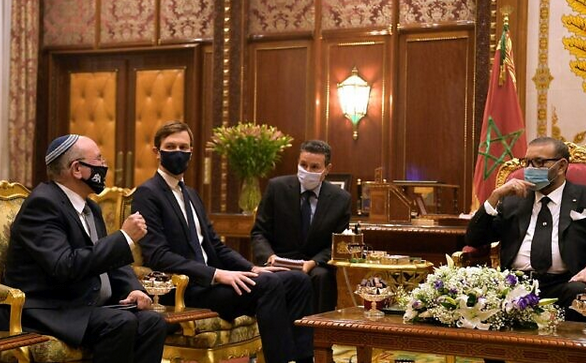PJD split over support for Morocco’s deal with Israel
Published on Thursday 28 January 2021 Back to articles
Israeli’s NSA Meir Ben-Shabbat, Jared Kushner, and King Mohammed VI at Rabat’s Royal Palace, 22 December 2020 | photo: Amos Ben Gershom
The leadership of Morocco’s ruling Parti Justice et Développement (PJD) party is desperately trying to contain a backlash among its rank-and-file which has been prompted by Morocco’s recent normalisation of diplomatic relations with Israel. In December 2020, a trilateral deal — brokered by former President Donald Trump’s administration as part of its controversial Middle East peace initiative — was announced between the US, Morocco and Israel. Under its terms, Rabat agreed to normalise relations with Israel in return for Washington’s recognition of the Kingdom’s sovereignty over disputed Western Sahara.
On 24 January the White House reported that, while there were some question marks over whether President Joe Biden would run with this normalisation deal once he took office, National Security Advisor Jake Sullivan had spoken with Israel’s National Security Advisor Meir Ben Shabbat and that he reaffirmed Biden’s ‘unwavering commitment to Israel’s security.’ According to the White House statement, the pair also discussed opportunities to enhance the partnership in the coming months, including by ‘building on the success of Israel’s normalisation arrangements with UAE, Bahrain, Sudan, and Morocco.’
On the same day: the Israeli cabinet unanimously approved the normalisation agreement; its Foreign Ministry announced it would open a liaison office in Rabat in the coming days; and the Ministry of Economy and Industry said that Morocco and Israel would soon sign a deal outlining trade and economic cooperation.
For those Moroccans hoping that this normalisation deal would quietly disappear once Donald Trump left office, this confirmation came as a disappointment. Indeed, this saga has dealt one blow after another to the ruling party.
The PJD’s more ardent pro-Palestinian factions amongst its ranks will continue to agitate against the deal and against the party’s leadership’s support of it. Some of these factions — especially among the country’s youth — will push harder than ever to try to overturn the current leadership in favour of one that is less compliant to the Palace and the country’s establishment.
The party is, however, unlikely to contain these factions through a combination of threats and persuasion, with the latter aimed at highlighting the need to hold the party together as national elections approach. The role of the former premier and party leader, Abdelilah Benkirane — who so far has supported his successor Prime Minister Saadeddine Othmani’s stance — will remain critical in this.
While this normalisation crisis has deepened the internal schisms inside the PJD, and could well dent some of its popularity, it is unlikely to be a fatal blow to its chances at the October 2021 general election. The PJD will, however, need to work hard to mobilise its supporters when the campaign takes place.
With Joe Biden unlikely to change course in Washington’s acknowledgement of Moroccan sovereignty over the disputed Western Sahara, Polisario will intensify its rhetoric and increase its threats of military escalation against the Kingdom. It will also continue to launch attacks against Moroccan-controlled parts of the territory as and where it can.
However, Morocco will easily deflect these attacks; it will do everything it can to capitalise on the US acknowledgement, and further consolidate its hold over the territory.
This excerpt is taken from Morocco Focus, our monthly intelligence report on Morocco. Click here to receive a free sample copy.


